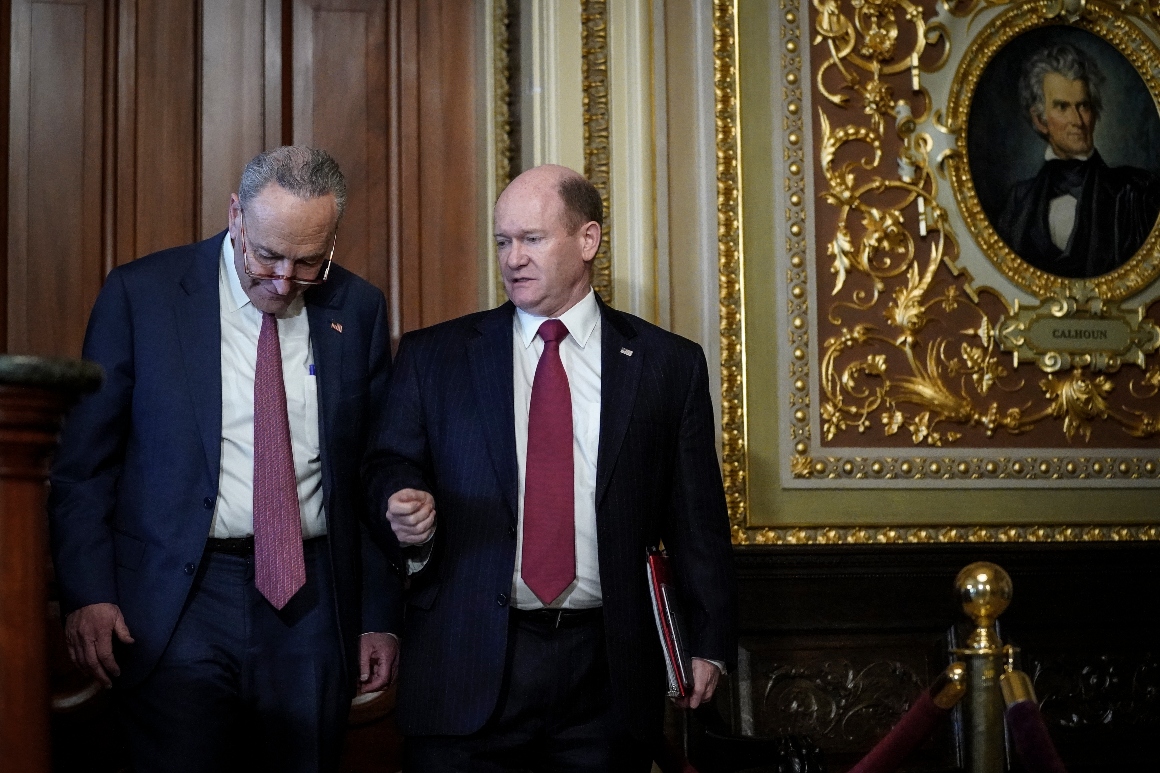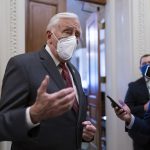Senate negotiators struck a deal on $10 billion in Covid aid on Monday, according to four people familiar with the agreement, setting the chamber on a potential course to clear the bill this week.
The compromise would reprogram billions in unused money from other coronavirus bills to deliver funding for therapeutics, testing and vaccine distribution. However, it does not include global pandemic aid sought by Democrats and a handful of Republicans, the people said, which could become a sticking point when the package comes before the House.
Senators have received a preliminary budget score from the Congressional Budget Office, paving the way for the deal to be publicly announced as soon as Monday, the people said, although there was still last-minute haggling taking place on Monday afternoon.
Sen. Chris Coons (D-Del.) and Senate Majority Leader Chuck Schumer pressed negotiators to include $1 billion in global vaccine aid after lawmakers shaved down the package last week from $15.6 billion to $10 billion, zeroing out what had been $5 billion in global Covid aid.
Negotiators were unable to agree on how to pay for the international money, the sources said. Coons, Schumer and Sens. Patty Murray (D-Wash.), Mitt Romney (R-Utah), Richard Burr (R-N.C.), Roy Blunt (R-Mo.) and Lindsey Graham (R-S.C.) were the lead negotiators. CNN first reported the developing agreement on Monday.
Schumer is focused on the confirmation of Judge Ketanji Brown Jackson to the Supreme Court this week, but with agreement among all 100 senators the chamber could quickly pass the coronavirus aid package and send it to the House. Democrats in that chamber had dropped a Covid assistance package from a massive government spending bill last month after complaints from members about using money that Congress had previously allocated to their home states.
If the Senate acts quickly, Democrats in the House will be under intense pressure to send the aid package to President Joe Biden’s desk by this week. Both chambers have just a handful of days before leaving for a two-week recess.
But multiple Democrats in the lower chamber are outraged that billions of dollars for global vaccine efforts will be excluded. Several have publicly threatened to oppose the package without that international funding component — something they say Biden and other officials have long promised.
“We’re faced with a complete shutdown of international effort,” said Rep. Tom Malinowski (D-N.J.), one of those Democrats who said he can’t support a package without the global aid. “We’re the United States of America. We’re supposed to be funding at least 25 percent of global effort. That’s just our fair share.”
The drop of the global Covid funding comes at a time when Covid-19 cases and hospitalizations are on the rise in Europe, Hong Kong and China and as top Biden officials scramble to prepare for a similar surge this spring.
Without additional funding, USAID will not be able to help vaccinate millions of people in low-income countries, including those in Africa. USAID is the main agency helping facilitate vaccinations across the globe, partnering with COVAX, the global vaccine facility, and host governments.
“Right now, as we proceed in our pandemic, our worst variants of concern are arising out of unvaccinated populations in low- and middle-income countries. The only way we are going to stop them from coming to the U.S. is to be vaccinating low- and middle-income countries,” said Peter Hotez, dean of the National School of Tropical Medicine at Baylor College of Medicine and co-director of the Texas Children’s Hospital Center for Vaccine Development. “The reality is if you want to get big global projects done it always falls to the U.S. to take the lead, and it doesn’t look like it’s happening now.”
Congress may come back to the issue of fighting the pandemic on a global scale later this year, according to two people familiar with ongoing talks. Congress could take up a broader international aid bill this spring or summer.



















